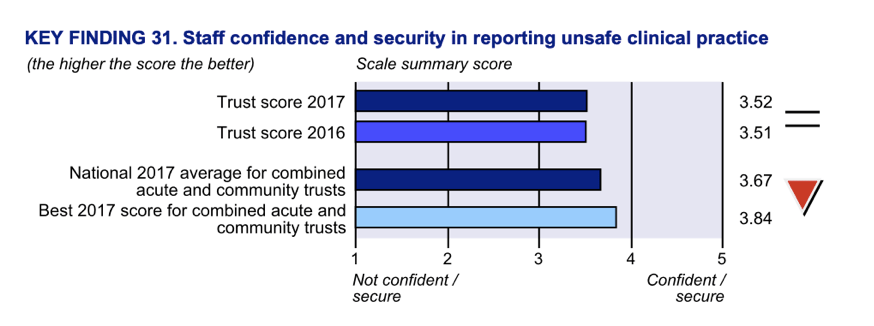By Dr Minh Alexander NHS whistleblower and former consultant psychiatrist, 27 September 2018
Summary: The National Guardian is relying on unverified Speaking Up data obtained by very variable methods and supplied by NHS trusts, and is drawing conclusions from too little evidence. The National Guardian inexplicably fails to collect or publish any data on whether whistleblowers’ concerns are addressed. Parliament has been alerted to this mission-critical failure and Health and Social Care Committee has indicated that it will follow up this issue.
Background
I asked the National Guardian in January and February 2017 about the issue of data quality when evaluating progress, when there seemed to be no clear answer:
|
Agreed record of meetings on 23.01.2017 and 2.02.2017 with Henrietta Hughes National Guardian “MA What data are local guardians collating and has it been agreed with your office? Is it standardised? HH “What” has been agreed with us and is standardised “How” – no. “How” is very much what works for the organisation. So long as information held separately from main databases. We haven’t been prescriptive. MA How do you know data from local Guardians isn’t fiddled or flawed in some other way? HH Ultimately it will reflect in the staff survey. MA Have you got a means of quality control to check quality of local guardians’ data? HH We’re working on trust…. MA So no checks? HH We don’t have access to their information systems. Are you suggesting we do so? Is that appropriate? MA You have the remit for picking up local failures including by local guardians, and Safeguarding against local failure. HH We haven’t received any information about problems with local guardians. MA You have received no concerns about local guardians’ inappropriate actions or omissions? HH We did have one. Not from a member of staff. We were copied into something. I’m not sure. The individual didn’t meet the needs of the staff. …..MA How are SUGs measuring staff experience? HH It varies, Different trusts need different things MA What are the different ways in which SUGs are measuring staff experience? HH Working in partnership at local level. Pulse surveys as well as the annual staff survey. MA What are the pulse survey questions? HH We haven’t received the outputs of those yet. MA But what questions are being asked? HH We haven’t asked specifically HH Every organisation sends something in. Learning shared.” |
As far as I am aware, there is still no resolution regarding data quality checks. Guidance documents and correspondence from the National Guardian’s Office to trust Freedom To Speak Up Guardians, disclosed by trusts, do not contain any evidence that the National Guardian’s Office does any more than specify the data that it requires. There is no evidence of any quality sampling and checking by the National Guardian’s Office.
Final data for 2017/18
The National Guardian published a report on 20 September 2018 about Speaking Up data returned to her in 2017/18 by trust Freedom To Speak Up Guardians.
This revealed that in 2017/18, trust Freedom To Speak Up Guardians recorded 7087 cases, and received feedback from 2407 staff, 2077 of whom reportedly said they would speak up again.
The report of 20 September was accompanied by a press release on 24 September 2018 which claimed:
This was also tweeted by the National Guardian’s Office that day.
This claim is unsupportable as clear instances of detriment and failures to act upon staff concerns continue to occur. Recent examples are:
- Whistleblowing at East of England Ambulance service
- Whistleblowing at Wirral University Teaching Hospitals NHS Foundation Trust
- Whistleblowing at Shrewsbury and Telford Hospital NHS Trust
- Whistleblowing at Brighton and Sussex University Hospitals NHS Trust
- Whistleblowing at Essex Partnership University NHS Foundation Trust
The National Guardian’s 20 September report claimed that there has been an ‘encouragingly large response rate’ from staff who have used the Speak Up Guardian service, but no figure is given.
Neither has the National Guardian published trust level data on NHS staff feedback about Speak Up Guardian services. Only global figures are provided. This seems inconsistent given that she has published all other Speaking Up data at trust level.
And how can the National Guardian’s Office possibly know, without exhaustive investigation, that concerns are always handled ‘confidentially’? Whistleblowers sometimes find out, in retrospect, from disclosed personal data and court documents that there is collusion between trust managers from an early stage of their whistleblowing journey.
‘Would you speak up again?’
The National Guardian’s tracking of outcome focuses centrally on the question ‘Would you speak up again?’ The implication in all the material from the National Guardian’s Office is that this is an effective measure of success. But no evidence has been presented to demonstrate that this is a valid measure of effective whistleblowing governance.
Reported willingness to speak up again does not necessarily mean that a worker has had a wholly positive outcome. Data obtained by FOI from some NHS trusts has shown that staff may indicate an intention to speak up again even where they do not feel their concerns have been addressed, or even when they have suffered detriment. For example, this Survey Monkey report of staff feedback at Leeds and York Partnership NHS Trust showed that although not all staff felt their concerns had been properly addressed or addressed at all, and despite some reporting detriment, all said they would speak up again:
Leeds and York Partnership NHS Trust Speaking Up feedback data FOI 2449
It may well be that this expressed intention to speak up again largely reflects the professional commitment amongst frontline healthcare workers. But it may also partly reflect an element of something social scientists and psychologists call ‘social approval’, which can kick in when people respond to surveys. Equally, it may reflect most staff’s inexperience in whistleblowing, and a lack of appreciation of how badly things can go wrong if a worker persists in raising concerns.
Some data on how risk of reprisal increases with successive attempts to raise concerns can be found in the 2014 ‘Inside Story’ report by Public Concern at Work and Greenwich University:
Whistleblowing – The Inside Story
No data gathered on whether concerns are resolved
Worryingly, the National Guardian provides no data on whether staff feel their concerns have been addressed. Disclosed template reporting forms have shown that the National Guardian does not ask trust Freedom To Speak Up Guardians to gather feedback data from NHS staff on whether their concerns are addressed. To illustrate, this is a copy of the National Guardian’s standard reporting template disclosed by David Loughton’s trust, the Royal Wolverhampton NHS Trust:
Royal Wolverhampton NHS Trust Speaking Up data return to National Guardian
This failure to check if concerns are addressed is a key and inexplicable omission. Surely a central function of the National Guardian’s office is to monitor whether whistleblowers’ concerns are addressed? The failure to deal with concerns is probably the most distressing and single most important matter to all genuine whistleblowers who fall foul of the current flawed system. But it is also a political hot potato that the government likes to sweep under the carpet. The National Guardian’s avoidance of clarity about whether NHS staff’s concerns are addressed mirrors Robert Francis’ behaviour in the Freedom To Speak Up Review. Francis reported in great detail about the employment disputes that whistleblowing cases get bogged down in, but did not breath a word about the types of serious public interest disclosures that had never been resolved.
Generally, trust FOI data also shows great variation in how trusts obtain feedback data on staff experience of Speak Up Guardian services. Some have better audit trails, for example, by using electronic surveys. Others do not collect any written material from staff and depend only on trust Freedom To Speak Up Guardians to document what staff purportedly said.
I will report in more detail on the FOI data from trusts in due course.
Non-reporters
But at least both the National Guardian’s report of 20 September and the press release of 24 September acknowledged that six NHS trusts had not reported any cases and or returned data to the National Guardian in 2017/18. The trusts were listed in the National Guardian’s report as follows:
“A note on non-reporting trusts.
Six trusts did not record any cases of speaking up throughout the year.
These are:
- Black Country Partnership NHS Foundation Trust
- James Paget University Hospitals NHS Foundation Trust
- London North West Healthcare NHS Trust
- Royal Papworth Hospital NHS Foundation Trust
- South Tees Hospitals NHS Foundation Trust
- Walsall Healthcare NHS Trust
The National Guardian’s Office has raised this point with regulators and requested that they take appropriate action to support these trusts.”
| This the National Guardian’s data upon which the report of 20 September was based:
Speaking Up data Q1 2017/18 – reconciled Speaking Up data Q2 2017/18 – reconciled |
Papworth, one of the six trusts that the National Guardian reported to the regulators for not reporting any Speaking Up cases, actually scored above average in its peer group on staff confidence in speaking up on the 2017 NHS staff survey. Its staff survey results are quite good generally, as is often the case for specialist trusts. A point that has already been made repeatedly is that good trusts do not need Freedom To Speak Up Guardians.
However, the other five trusts all scored below average on staff confidence in speaking up, and above average on bullying. Details are provided in the annex below. This is not cause for confidence that ‘the right action will be taken’, as the National Guardian’s Office press release claims.
The National Guardian’s foreword in the September 20 report states: “The absolute number of cases is not necessarily reflective of the speaking up culture in an organisation” which is fair enough.
But the upbeat press release by the National Guardian’s Office went too far and implied that the number of cases denotes success of the model:
“Thousands of NHS workers bring cases to Freedom to Speak Up Guardians…NHS workers in trusts in England are speaking up to their Freedom to Speak Up Guardians, confidentially, knowing the right actions will be taken as a result….A trusted alternative channel for speaking up where workers feel they can’t use other channels is being developed…The increase in the number of cases, quarter on quarter, that are being brought to guardians is encouraging as workers become more familiar with and confident in this new route for speaking up”
There is insufficient reflection here on the fact that workers are being encouraged to make themselves vulnerable, most likely without properly informed consent, when there is no guaranteed protection.
Some of the most notorious trusts for whistleblowing detriment have high levels of reporting to Freedom To Speak Up Guardians, which may put staff in harm’s way.
Mid Yorkshire Hospitals NHS Trust
The Mid Yorkshire Hospitals NHS Trust has long had troubled governance and is known to whistleblowers.
As recently as 2017, the trust was found by the Employment Tribunal to have unfairly dismissed and to have subjected worker who made a protected disclosure (about bullying) to a detriment, but the whistleblowing aspect of the claim failed because it was presented out of time:
Miss G Wright v Mid Yorkshire Hospitals NHS Trust
As an indicator of problems with internal reporting, Mid Yorkshire generated the highest numbers of external whistleblowing disclosures to CQC over the period April 2015 to March 2017 – 58 in total.
According to the National Guardian’s published data, there have reportedly been 159 cases raised with the trust’s Freedom To Speak Up Guardian, and 5 reported instances of detriment during financial year 2017/18.
An FOI disclosure by Mid Yorkshire reported that the trust started collecting feedback in May 2017, and extended the exercise to staff who had spoken up prior to that date. The trust claimed that 116 cases were closed between September 2016 and March 2018, and that feedback questionnaires were sent to 98 staff whose cases had been closed, 69 of whom responded. 68 reportedly said they would speak up again.
According to the FOI disclosure, 18 staff were not asked to give feedback. Those who disclosed anonymously were reportedly not contactable. Worryingly, some staff had also left the trust after making disclosures.
29 staff did not respond to requests for feedback.
It is not possible to tell at this stage exactly what percentage of all Mid Yorkshire trust staff who have disclosed to the Speak Up Guardia have been asked for, or given feedback. However, it does seem that a substantial proportion of outcomes are as yet unaccounted for.
The experience of the staff who are too frightened to identify themselves, who leave and or who do not return feedback is of obvious interest. The National Guardian should be both acknowledging this in her analyses and making efforts to improve data capture across the system in a way that is safe for whistleblowers.
Mid Yorkshire has had the same Chair since 2012, the same Director of Nursing since 2014, the same Chief Executive and Director of Workforce since 2016.
In all the circumstances, can the trust’s staff really be sure that the trust would take ‘the right action’ if they speak up?
Unresolved questions
Ultimately, how much taken from data supplied by trusts themselves? I imagine many Freedom To Speak Up Guardians will act in good faith but equally, some are part of the corporate machinery responsible for orchestrating cover ups.
The apparent lack of any quality control over the data published by the National Guardian leaves it open to question.
There have also been some serious issues about the presentation of data by the National Guardian’s Office, to which I will return at a later date.
I would remind the National Guardian that she said to me in February 2017 that the ultimate proof of the pudding will be in the national NHS Survey results. So far, there is zero movement on that with respect to confidence in speaking up, for all the millions spent on the Freedom To Speak Up project.
UPDATE 29 SEPTEMBER 2018:
The Health Service Journal questioned the National Guardian’s Office about its failure to track whether whistleblowers’ concerns are being addressed. The Office advised ‘data was collected locally on how concerns were resolved’. This is a strange evasion and also a half truth. I know from FOI data that some NHS trusts do not ask staff who contacted Freedom To Speak Up Guardians if their concerns were resolved, and some admitted to not collecting any staff feedback at all.
I have written to parliament to pass on the evidence about this crucial failure of governance, copied to the UN Rapporteur on Freedom of Speech who reported on whistleblowing in 2015:
UPDATE 6.10.2018
I have received a response from the Chair of Health and Social Care Committee, picking up the concerns about the National Guardian’s failure to track whether whistleblowers’ concerns are addressed:
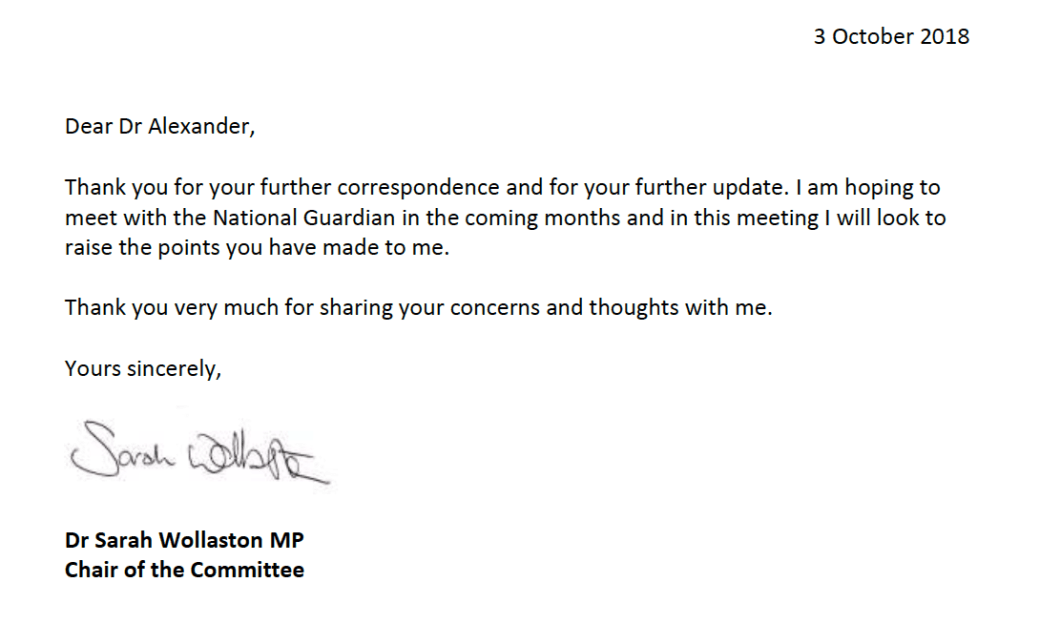
ANNEX
These are further details on the six trusts which did not report any cases or failed to return data to the National Guardian in 2017/18:
Black Country Partnership NHS Foundation Trust
No cases reported for Q1-4
Rated ‘Good’ by the CQC
Listed Freedom To Speak Up Guardian: Andy Green Director of Corporate Governance and Trust Secretary
Above average bullying (21% v 20% average for combined MH/LD and community trusts)
Below average on staff confidence in speaking up:
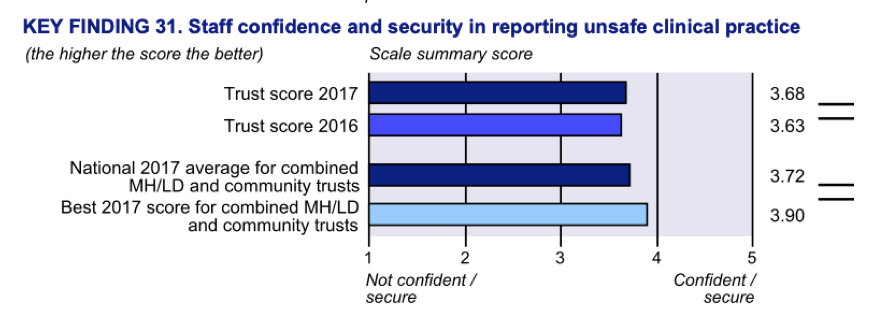
James Paget University Hospitals NHS Foundation Trust
No cases reported for Q 1-4
Rated ‘Good’ by the CQC
Listed Freedom To Speak Up Guardian: Julie Smith Head of Compliance and Quality Improvement
Above average bullying (27% v 25% average for acute trusts)
Below average on staff confidence in speaking up:
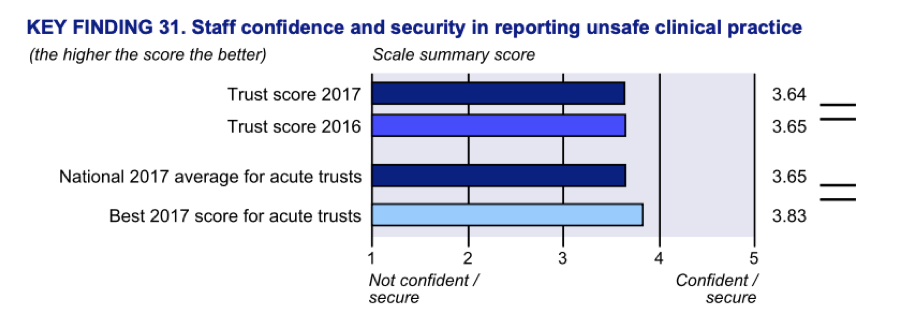
London North West Healthcare NHS Trust
No cases reported for Q1-4
Rated ‘Requires Improvement’ by the CQC
Listed Freedom To Speak Up Guardian: Fiona Coogan Director Infection Prevention and Control
Above average bullying (30% v 24% average for combined acute and community trusts)
Below average on staff confidence in speaking up:
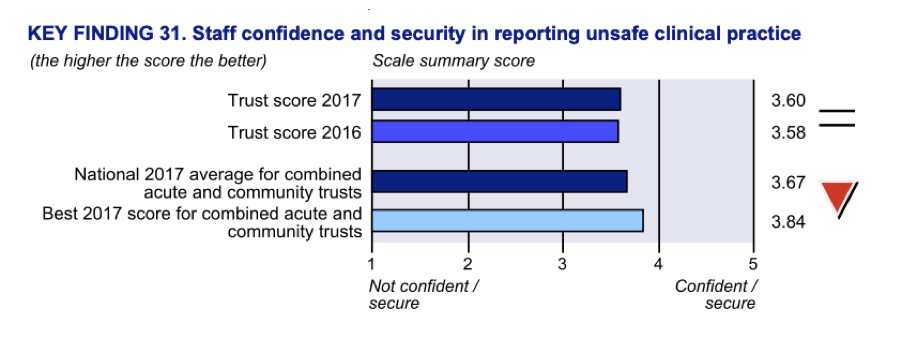
Royal Papworth Hospital NHS Foundation Trust
No cases reported for Q1-4
Rated ‘Good’ by the CQC
Listed Freedom To Speak Up Guardian: Richard Quigley Lead Nurse Transplant
Average bullying (23% v 23% average for acute specialist trusts)
Above average on confidence in speaking up:
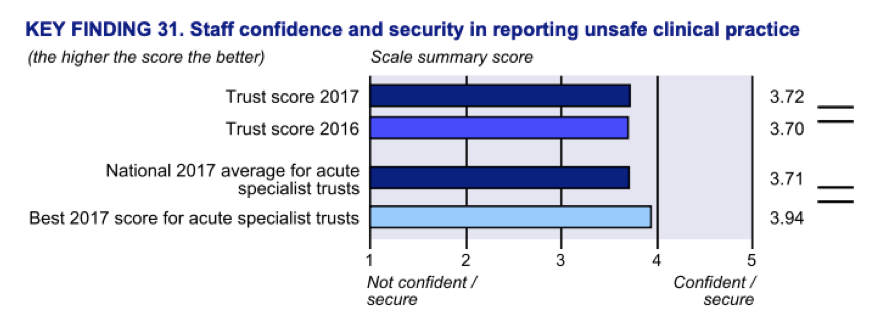
South Tees Hospitals NHS Foundation Trust
No cases reported for Q1-4
Rated ‘Good’ by the CQC
Listed Freedom To Speak Up Guardian: Debbie Elliott Patient Experience Team Advisor
Above average bullying (26% v 24% average for combined acute and community trusts)
Below average on confidence in speaking up:
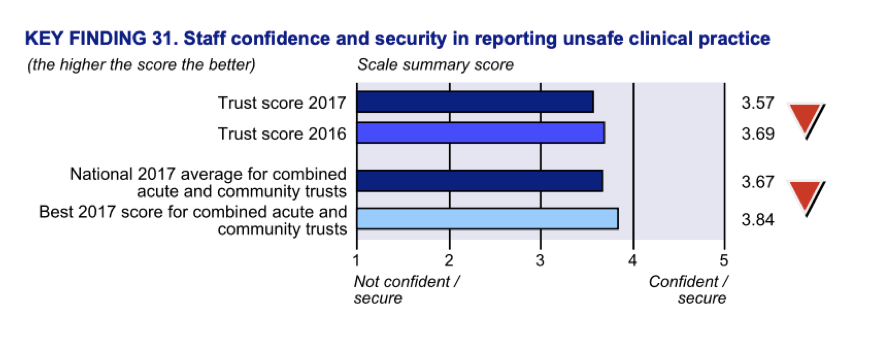
Walsall Healthcare NHS Trust
No data returned for Q1-3, no cases reported for Q4
Rated ‘Requires Improvement’ by the CQC
Listed Freedom To Speak Up Guardians: Shabina Raza, Antimicrobial Lead Clinician and Kim Sterling Podiatrist
Above average bullying (29% v 24% average for combined acute and community trusts)
Below average on confidence in speaking up:
